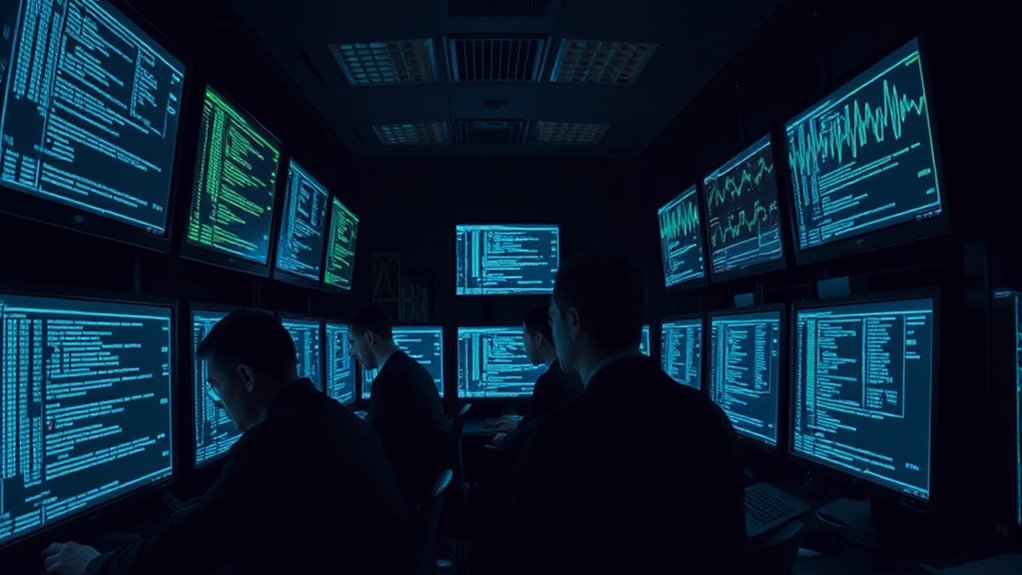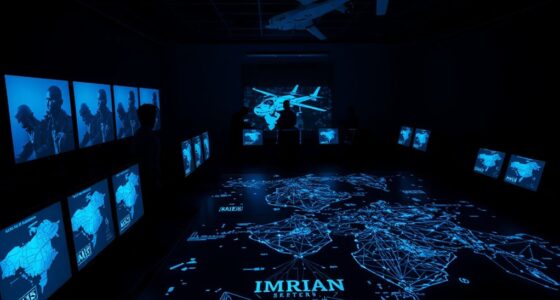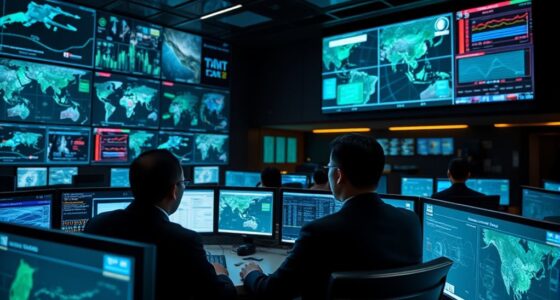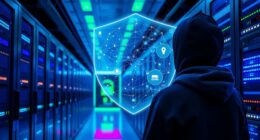GCHQ’s secret AI for signals intelligence automates the interception and analysis of massive global data streams in real time, helping you uncover hidden patterns, decode encrypted messages, and predict threats before they fully develop. It learns from new information, adapts its techniques, and quickly alerts analysts to suspicious activities. This cutting-edge technology transforms espionage, giving security agencies a strategic advantage. Continue exploring to discover how this AI enhances national security and reshapes intelligence operations.
Key Takeaways
- GCHQ’s AI analyzes vast global signals to detect patterns, decode encrypted messages, and identify suspicious activities efficiently.
- It employs machine learning to recognize subtle anomalies and covert communications that humans might overlook.
- The AI supports predictive threat analysis, enabling proactive measures before threats fully develop.
- Its capabilities significantly enhance intelligence speed, accuracy, and strategic decision-making in national security.
- Secrecy surrounds the AI’s full design and operation, reflecting its critical and classified role in signals intelligence.
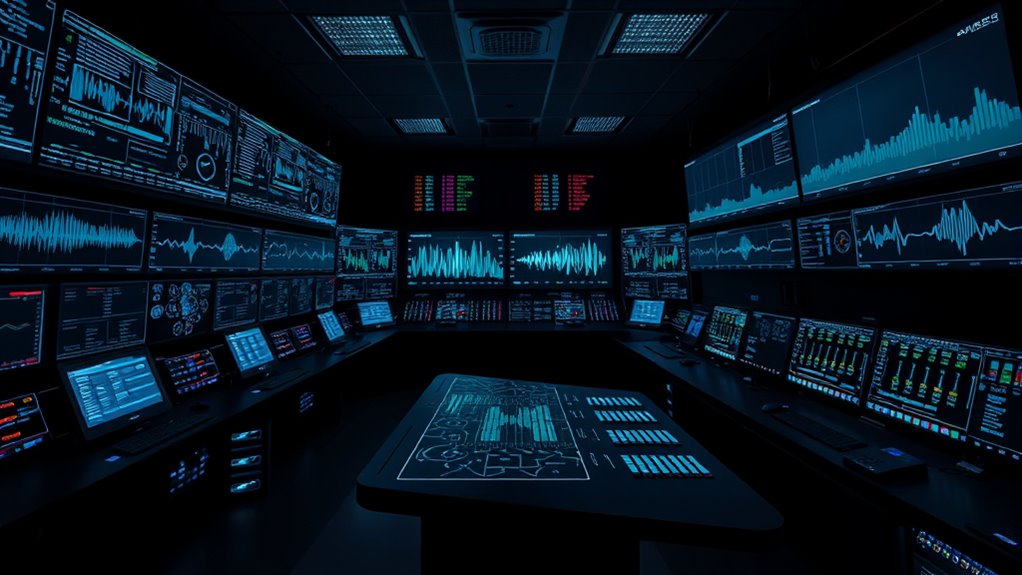
Have you ever wondered how intelligence agencies crack complex communications? Behind the scenes, GCHQ, the UK’s signals intelligence agency, employs cutting-edge technologies to intercept, analyze, and interpret vast amounts of data from around the world. Central to this effort is their secret AI system, a sophisticated tool designed to sift through enormous volumes of signals with unmatched speed and accuracy. While many details remain classified, recent disclosures give a rare glimpse into how this AI revolutionizes signals intelligence.
This AI isn’t just an ordinary data processor; it’s a highly advanced system built to identify patterns, decode encrypted messages, and flag suspicious activities in real time. You might imagine it as a digital detective, tirelessly hunting through streams of raw data for clues that could threaten national security or reveal plots against allies. Unlike traditional methods that relied heavily on manual analysis and human intuition, GCHQ’s AI automates much of this work, allowing analysts to focus on the most critical insights. Its ability to learn and adapt from new data makes it particularly powerful, constantly improving its accuracy and efficiency.
The AI’s core strength lies in its ability to recognize subtle patterns within noisy signals—something that would take humans countless hours to detect. It uses machine learning algorithms trained on vast datasets, which enable it to distinguish between innocent chatter and malicious communications. This capability is essential because adversaries often employ encryption, code words, or low-volume signals to evade detection. The AI can identify these hidden messages by analyzing minute details, such as timing, frequency, or unusual anomalies that might otherwise go unnoticed. When it detects something suspicious, it rapidly alerts analysts, who then decide on the next steps, whether it’s further investigation or tactical intervention.
GCHQ’s secret AI also plays a role in predictive analysis. By analyzing trends and historical data, it can forecast potential threats before they fully materialize. This proactive approach gives intelligence agencies a critical edge in preventing attacks or intercepting plans early. It’s a game-changer, shifting the focus from reactive to proactive intelligence gathering. However, with such power comes significant responsibility, and GCHQ must continually refine its AI to avoid false positives that could lead to unwarranted investigations or breaches of privacy.
In essence, GCHQ’s secret AI represents a leap forward in signals intelligence. It embodies a blend of advanced machine learning, vast data processing, and strategic insight — all working together to keep nations safe. While much about this technology remains secret, what’s clear is that AI is transforming the landscape of espionage, making it faster, smarter, and more precise than ever before.
Frequently Asked Questions
How Does Gchq’s AI Differ From Commercial Surveillance Tools?
GCHQ’s AI differs from commercial surveillance tools by being highly classified, specialized, and tailored for national security. You won’t find it used for marketing or consumer data; instead, it focuses on intercepting signals, analyzing threats, and protecting the nation. Its capabilities are more advanced, with deeper integration into intelligence operations, making it far more sophisticated and sensitive than typical commercial tools, which prioritize profit over security.
What Are the Ethical Considerations of Using AI for Signals Intelligence?
You should consider that using AI for signals intelligence raises significant ethical issues, such as privacy invasion, data security, and potential misuse. You need to guarantee transparency and accountability, balancing national security with individual rights. You might face dilemmas about consent and oversight, and must be cautious to prevent bias or errors that could harm innocent people. Ultimately, responsible use of AI demands strict regulations and ongoing ethical evaluation.
Can This AI Be Used for Counter-Terrorism Purposes?
Yes, this AI can be used for counter-terrorism purposes. By analyzing signals swiftly and selectively, you can uncover covert communications and identify dangerous threats before they strike. Its ability to sift through massive data makes it a powerful tool for preventing tragedies. With this technology, you strengthen security, stop sinister schemes, and safeguard societies, turning intelligence into an invaluable asset in the fight against terrorism.
How Does GCHQ Protect Its AI From Cyber-Attacks?
You can’t overlook how GCHQ safeguards its AI from cyber-attacks. They implement robust cybersecurity measures like encryption, multi-layered firewalls, and continuous monitoring to detect threats early. Regular updates and patches are vital to fix vulnerabilities, and strict access controls limit who can interact with the AI. These proactive steps ensure the AI stays secure, resilient against cyber threats, and functions effectively within their intelligence operations.
Will the Use of This AI Impact Global Privacy Rights?
Yes, using this AI could impact global privacy rights. You may find your data more vulnerable to surveillance or misuse if safeguards aren’t strict. While the AI aims to improve security, it also has the potential to infringe on individual privacy if deployed without transparency. It’s essential that organizations using such AI prioritize ethical standards and privacy protections to prevent erosion of global privacy rights.
Conclusion
As you close this glimpse into GCHQ’s hidden AI, imagine a silent sentinel in the shadows, ever-watchful and unseen. Like a lighthouse guiding ships through stormy waters, this secret technology quietly navigates the chaos of signals, revealing what’s hidden in the darkness. Though veiled in mystery, its presence shapes the course of nations, a ghostly guardian standing at the crossroads of security and secrecy—an unseen force shaping the future in the shadows.
